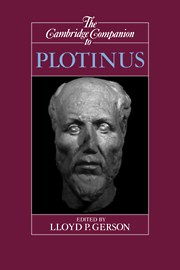Book contents
- Frontmatter
- Introduction
- 1 Plotinus
- 2 Plotinus's metaphysics of the One
- 3 The hierarchical ordering of reality in Plotinus
- 4 On soul and intellect
- 5 Essence and existence in the Enneads
- 6 Plotinus on the nature of physical reality
- 7 Plotinus on matter and evil
- 8 Eternity and time
- 9 Cognition and its object
- 10 Self-knowledge and subjectivity in the Enneads
- 11 Plotinus
- 12 Human freedom in the thought of Plotinus
- 13 An ethic for the late antique sage
- 14 Plotinus and language
- 15 Plotinus and later Platonic philosophers on the causality of the First Principle
- 16 Plotinus and Christian philosophy
- Bibliography
- Index
12 - Human freedom in the thought of Plotinus
Published online by Cambridge University Press: 28 May 2006
- Frontmatter
- Introduction
- 1 Plotinus
- 2 Plotinus's metaphysics of the One
- 3 The hierarchical ordering of reality in Plotinus
- 4 On soul and intellect
- 5 Essence and existence in the Enneads
- 6 Plotinus on the nature of physical reality
- 7 Plotinus on matter and evil
- 8 Eternity and time
- 9 Cognition and its object
- 10 Self-knowledge and subjectivity in the Enneads
- 11 Plotinus
- 12 Human freedom in the thought of Plotinus
- 13 An ethic for the late antique sage
- 14 Plotinus and language
- 15 Plotinus and later Platonic philosophers on the causality of the First Principle
- 16 Plotinus and Christian philosophy
- Bibliography
- Index
Summary
To the memory of Jean Trouillard
Freedom belongs to the category of issues that affect the whole of Plotinus's metaphysics. Insofar as they are not merely beings ranged in a hierarchy but also moments in an infinite process by which the One expresses itself and infinitely offers itself as the Good, all aspects of this metaphysics, whether subjective or objective, are brought into play by freedom. Metaphysics must give an account of this process; it must express its dynamic and offer an explanation of its principal stages in narrative form. Consequently, what is at issue is nothing other than the freedom of each being to evolve or act, depending on its nature, within the context of the whole conceived systematically as depending upon and manifestating the One. “Freedom” has the same meaning at every level: that of a being to be what it is. This meaning pertains to the identity of the Good and Being: “It is obvious that the Good is in being, and in being it would clearly be for each individual in himself” (VI.5.1.23-5). One can legitimately ask, therefore, in what sense can we say that freedom is not identical with necessity? Indeed, in what sense is there even a place for freedom in a universal emanationism?
- Type
- Chapter
- Information
- The Cambridge Companion to Plotinus , pp. 292 - 314Publisher: Cambridge University PressPrint publication year: 1996
- 8
- Cited by

